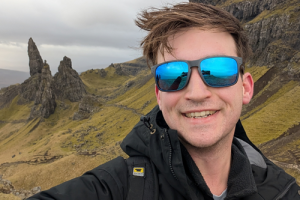A Call to Honor, Service, and Culture Heritage Management
Published June 27, 2025
 Though only 25, Sam Fuller has spent a lot of time in cemeteries.
Though only 25, Sam Fuller has spent a lot of time in cemeteries.
Fuller’s frequent graveside visits resulted from his two and one-half years of service as a member of the Military Funeral Honor Team. His responsibilities took him to cemeteries throughout Tennessee and even to Arlington National Cemetery for a short tour as a member of the Tennessee National Guard and the University of Tennessee at Chattanooga’s ROTC program.
A MA in Cultural Heritage Management student at Johns Hopkins University, Fuller, graduated in 2022 from UT-Chattanooga as an anthropology major, and earned a minor in military science and leadership. He immediately entered his current role as an officer with the U.S. Army, now stationed outside of Baltimore.
“I have had the honor of laying to rest 250 service members who passed, mostly through natural means,” said Fuller, who even served as a member of the Presidential Salute Battery during the funeral services for Donald Rumsfeld, Navy Captain and former Secretary of Defense. “It is remarkably humbling and a great honor to lay a service member to rest, and honor the deceased through the folding and delivery of that service member’s flag to the next of kin. We owe the deceased that respect, and I was proud to be a part of those teams.”
Fuller hopes to someday combine his love for public service and cultural heritage. He is considering opportunities with the State Department, allowing him to protect cultural assets at large, with the Department of Defense’s POW/MIA Accounting Agency as an archeological or repatriation team leader.
“I love digging in the dirt, and I also love underwater archeology,” said Fuller who has worked in terrestrial and inundated cultural sites. He has spent time doing excavations in submerged landscapes, retrieving Native American lithic artifacts eight miles offshore of Florida’s coast. He was also among a group of 16 JHU students who ventured to Scotland in March of 2025 for five days of heritage work, where he participated in a hands-on look at three-dimensional scanning capabilities that were used to document and preserve those heritage sites.
“I would love to be one of the people who go out, recover, and return services members home after they have met their unfortunate demise while serving their country in various theaters,” he said. “I also like conducting surveys and looking at data, quantitatively and qualitatively, to be able to tell stories more effectively. Conducting archaeological surveys and recoveries in that context allows us to tell the story of the individual, and the story of what may have happened. It’s a requirement for those of us in uniform to be culturally aware and understand cultural implications. We have to place emphasis on understanding why individuals think and act the way they do based off their culture and determine what’s important to those stakeholders from a heritage aspect. This allows us to respect and safeguard tangible sites or artifacts, and even intangible practices that may be foreign to us, especially in areas of conflict. The worst thing we can do is cause irreparable damage to heritage sites that are meaningful to a local or even global population.”
Fuller hopes to complete his graduate degree in 2026. He believes adding cultural management to this archaeology, anthropology, and military tool kit will present opportunities to incorporate technical, critical thinking, and analysis skills honed through the JHU program.
“I really appreciate the program’s global focus and its real-world application,” Fuller said. “It is expertly curated with faculty who are very professional and who own their craft. The instructors have structured their courses with rigor, but they are very keen on working with you. They understand that we are working professionals and are always happy to help. One of the best things that I will take away from this program is the sense of community that you get from it. Johns Hopkins does a very good job of engaging students and bringing them together in a peer network. I personally felt just as welcomed doing this online program as I did in person for my undergrad degree. It is phenomenal. The program is a great fit for any working professional interested in interdisciplinary studies.
“I think I am called to a life of public service,” he said. “This degree is setting me up for success.”
Attention: Students and Alumni
Are you a current AAP student or alumni and want to share your accomplishments?
Interested in pursuing a graduate degree at Johns Hopkins University?
Request information to learn more or apply here.